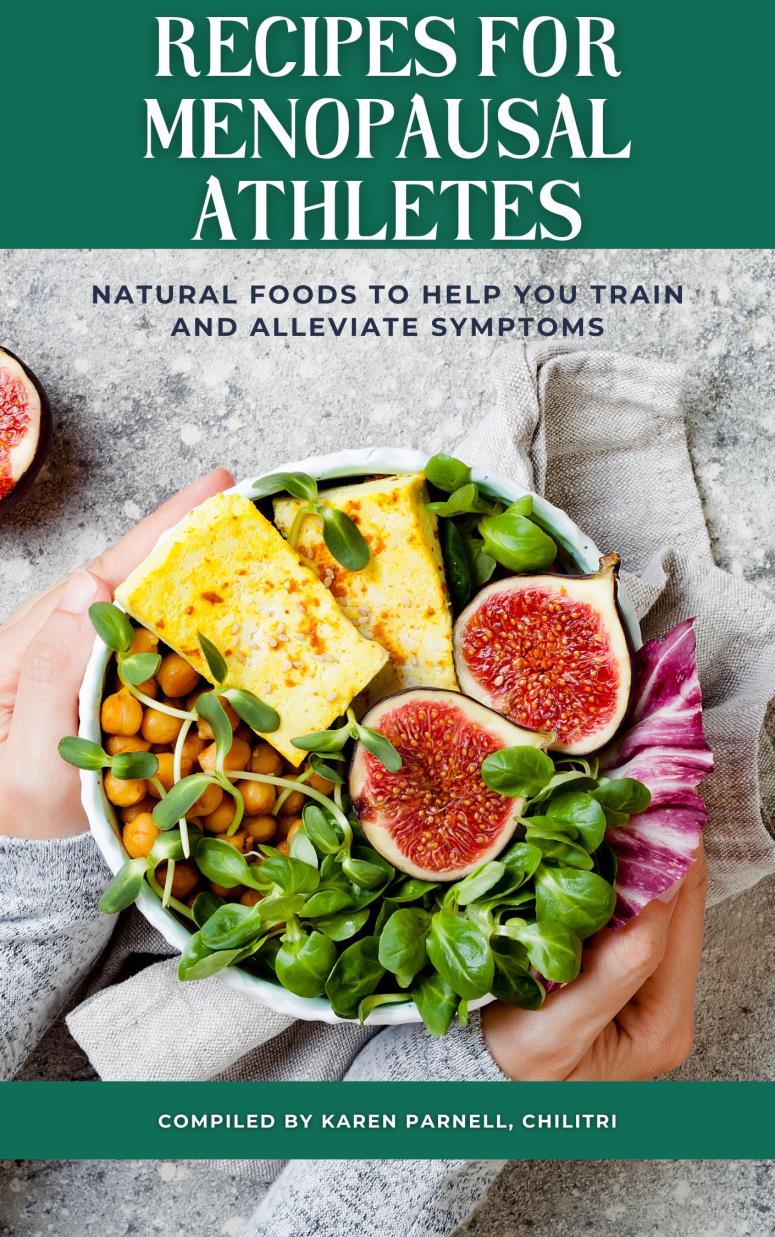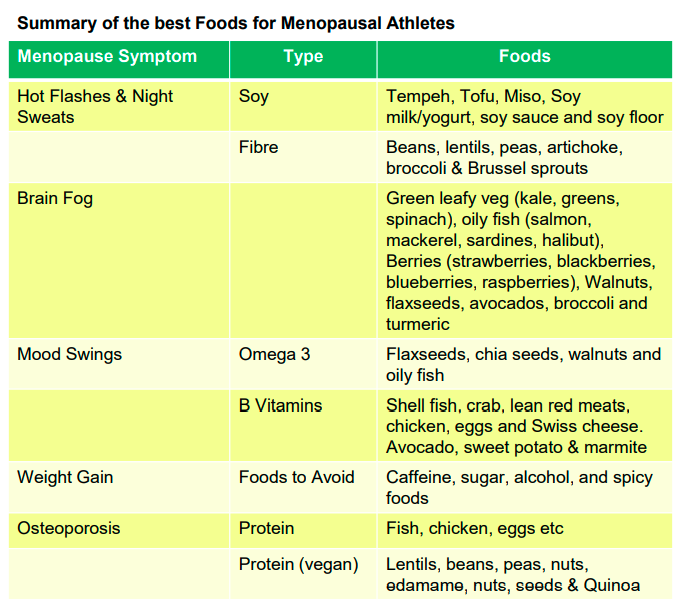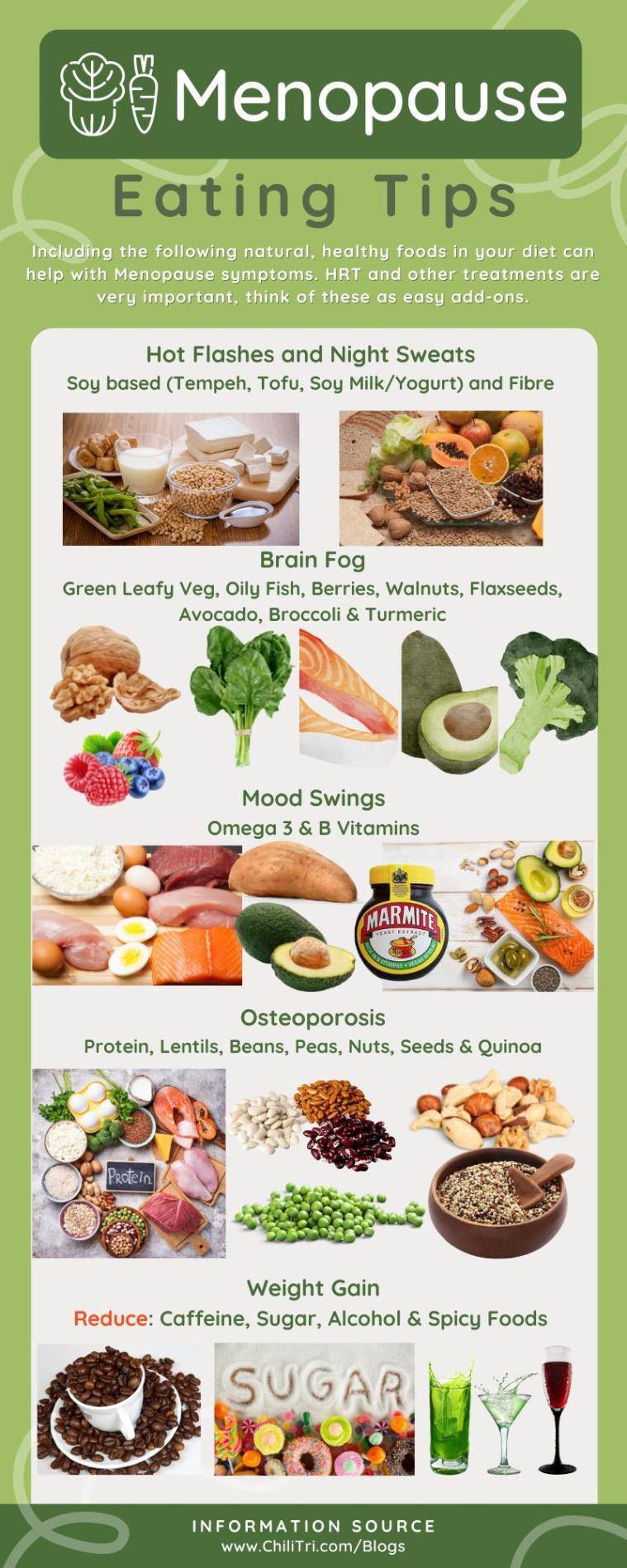Top Foods to help you Train During Menopause
 Karen Parnell
June 10, 2022
Karen Parnell
June 10, 2022

Top Foods to help you Train During Menopause
Menopause symptoms can be debilitating and range from hot flashes, trouble sleeping, mood swings to “brain fog”, aching joints and tiredness amongst others. A lot of these symptoms can be alleviated with the various types of Hormone Replacement Therapy (HRT). On top of this solution, we can also help by adding certain foods to our diet and removing others to help us feel better and have more energy to train.
Let’s looks at these symptoms in turn and discuss the natural foods we can add to our diet to help with them and enhance our ability to train for our events.
Get your FREE Recipes for Menopausal Athletes Book
Hot Flashes & Night Sweats
Soy
Soy is a nutritious plant-based protein that Asian cultures have been consuming for thousands of years. It’s also high in fibre, unsaturated fats, antioxidants, vitamins, and minerals. Soy originated in Asia but is now grown and available worldwide. Soybeans can be eaten on their own or used to make soy products like tempeh, tofu, miso, soymilk, soy yogurt, soy sauce, and soy flour. Soy is also often processed into soy protein isolate or soy concentrates, used for dietary supplements, powders, beverages, and packaged snack foods.
Soy may also have benefits for menopausal symptoms. A 2021 study of postmenopausal women found that when they added half a cup of soybeans to a low-fat plant-based diet had an 84% reduction in moderate to severe hot flashes, from five a day to one. A 2012 analysis of 19 studies found that soy isoflavone reduced hot flash intensity by 26%, compared to a placebo. Another analysis, done in 2015, looked at 10 studies and found that soy isoflavones reduced hot flashes by 11%. Note that soy isoflavones can take from several weeks to months to have these symptom-reducing effects, and they won’t necessarily be as significant as hormone therapies.
The most benefit of eating soy has been found when women begin eating it regularly at a younger age, a practice that is more often seen in Asian countries.
Minimally processed soy foods like organic tofu, tempeh, natto, miso, and edamame have much more nutritional value than soy protein powder or isolated soy concentrate added to certain packaged food items. It is best to avoid packaged soy products altogether and focus on whole, minimally processed forms of soy. Unsweetened, organic soymilk or soy yogurt can be another healthy option that’s easy to incorporate into your diet.
Most research suggests that regular, moderate consumption of high-quality soy foods is safe and offers the most health benefits.
For example, incorporating 1 or 2 servings of whole or minimally processed soy foods daily, like edamame, soy nuts, tofu, tempeh, and soymilk/soy yogurt. Asian women typically eat between 20-80 mg of isoflavones a day.
Get a menopause recipe book here.
Fibre
Experiencing hot flashes and night sweats can become a real inconvenience for menopausal women. Increasing fibre in your diet may help stabilize oestrogen levels and lessen symptoms. An added benefit to adding fibre can be a slimmer waistline.
Foods High in Fibre: Beans and peas such as lentils, black beans, green peas and lima beans, as well as artichokes, broccoli and Brussels sprouts. Bran cereals are great, too, but you’ll want to check the label to avoid cereals high in sugar.
Brain Fog
The term “brain food” used to refer to the nutritious foods needed during exams or other activities involving critical thinking. Now we know that foods that are beneficial to your brain are essential daily throughout life.
Menopause is a particular time of life when your brain could use a boost, to protect it from the natural changes that may come with aging and midlife, and help clear up the brain fog, forgetfulness, and concentration problems so many women worry about. If it feels like you are losing your mind, you’re not alone. In one study, sixty percent of midlife women reported an undesirable change in memory over the past few years. During perimenopause, when hot flashes and sleep issues can be at their worst, brain fog may be even more acutely felt.
Even if menopause symptoms like brain fog are under control, women need to take brain health seriously. Two-thirds of people diagnosed with Alzheimer's are women. A woman in her 60s is twice as likely to develop Alzheimer's over the course of her lifetime than breast cancer. Dementia can begin 10 to 20 years before symptoms start showing up.
Vitamins, minerals, antioxidants, and phytochemicals can help boost your brain health, so it’s a good idea to incorporate a wide variety of foods that contain them into your diet. Odds are, you already eat many of these foods - and if not, they can easily be added!
Green Leafy Vegetables
Kale, spinach, collard greens, and mustard greens are excellent sources of lutein and zeaxanthin, which may help protect eyesight and memory as you age. A 2015 study of over 950 older adults for five years found that those who ate at least two servings of dark leafy greens per day experienced a slower decline in brain function than those who didn’t eat any leafy greens.
Oily Fish
Salmon, halibut, mackerel, sardines, and tuna are packed with the omega 3 fatty acids EPA and DHA. Omega 3 fats have been shown to be beneficial in improving brain function in cases of mild Alzheimer’s disease and major depression, by increasing antioxidant activity and reducing inflammation. In Blue Zones, areas of the world where there are clusters of people who live to be over 100 years-old, fish is a staple of their diet, with very little, if any meat consumption. If you don’t eat fish, algae-derived EPA and DHA supplements are another great source of brain-boosting omega 3 fats.
Berries
Strawberries, blackberries, blueberries, and raspberries are rich in phenolic compounds, which are known to have antioxidant properties that can help prevent disease and reduce inflammation. Berries are also high in anthocyanins, antioxidant-rich pigments that give them their purple, red, and blue colouring. Research shows that anthocyanins can effectively reverse age-related deficits in certain aspects of working memory. Anthocyanins and other flavonoids are thought to work by inhibiting neuroinflammation, activating synaptic signalling, and improving blood flow to the brain. Anthocyanins are able to cross the blood-brain barrier allowing the compounds to have a direct beneficial effect. The more colourful your berry variety, the better! Try to buy organic when you can to reduce your exposure to harmful pesticides.
Get a menopause recipe book here.
Walnuts
A great source of alpha linolenic acid (ALA), an omega 3 fat, as well as other compounds that are good for your brain. A study conducted on 708 people between 2012 and 2014 found that those who consumed fifteen percent of their calories from walnuts daily for two years delayed the onset of cognitive decline, compared to those who did not eat any walnuts. Walnuts may actually improve the communication between nerves in your brain, while reducing inflammation and boosting creation of new neuron pathways.
Flaxseeds
High in ALA, an omega 3 fat and precursor to EPA and DHA, flaxseeds are also the best plant-based source of antioxidants. Eat ground flaxseed versus whole as it is much better absorbed. You can purchase them already ground or buy them whole and grind them yourself. Keep ground flaxseeds in your refrigerator or freezer to increase their shelf life. Flaxseed oil has been shown to improve the levels of brain neurotransmitters. Read more about this midlife superfood here.
Avocados
Sometimes criticized for being high in fat and calories, don’t be turned off by eating avocados! Avocado consumption has been shown to increase the density of lutein in the brain. A 2017 study found that daily consumption of one avocado led to a 25% increase in lutein from baseline over six months, compared to consumption of one potato or one cup of chickpeas. The avocado group also had improved memory, attention, and problem-solving ability. Avocados are also rich in folate, a nutrient that may be linked to an increased risk of depression and dementia in elderly adults
Broccoli
A great source of ALA, vitamin K, and choline, broccoli can help keep your memory sharp. Choline appears to boost brain function in adulthood, prevent loss of age-related memory, and have neuroprotective effects in degenerative brain conditions like Alzheimer’s. Animal studies have shown the ability of broccoli to slightly reduce brain inflammation in rats.
Turmeric
An Indian spice easily identified by its vivid yellow-orange colouring; turmeric has powerful health properties. Curcumin is the active compound in turmeric and has been studied for its many health benefits, including on the brain. Curcumin has been shown to reduce beta amyloid protein, a biomarker in the brain for Alzheimer’s disease. Research shows that consuming curcumin by itself does not lead to the associated health benefits due to its poor bioavailability, which appears to be primarily due to poor absorption, rapid metabolism, and rapid elimination. For example, combining curcumin with black pepper, which contains the ingredient piperine, is associated with an increase of 2000% in the bioavailability of curcumin.
Mood Swings
Every woman will experience mood swings during menopause. Eating foods that are rich in omega-3s and B vitamins can help fight feelings of depression and anxiety during menopause. You can increase omega-3s in your diet by adding flaxseeds and oily fish like salmon or mackerel. Unprocessed foods, such as poultry and lean meats, are full of B vitamins.
Foods High in Omega-3s: Flaxseed oil, chia seeds and walnuts, as well as oily fish like salmon and mackerel.
Foods High in B Vitamins: Shellfish, crab, lean red meats, chicken, eggs and Swiss cheese. For vegans it’s avocado, sweet potatoes, and Marmite.
Get a menopause recipe book here.
Weight Gain & Slowed Metabolism
If energy intake (calories eaten) equals energy expenditure (calories burned), weight is stable. But during the menopause life stage, there are internal factors like changes in circulating hormones that lead to alterations in how our body burns calories, so lots of exercise doesn’t offset our intake in the same way it once did. For many of us, our activity decreases while our calorie intake might increase.
Engaging in healthy lifestyle strategies is essential for every midlife woman. To achieve weight maintenance or weight loss, the top strategies include:
- Maintaining a healthy diet and eating regular meals, including breakfast. A whole food diet like the Mediterranean Diet or a plant-based diet is considered the best choice.
- Limiting unhealthy foods like sweets, fast food, junk food, and other processed foods is key. It’s okay to reward yourself with a treat occasionally, but it should be a treat and not an everyday thing.
- Avoid fad diets. Choose a dietary lifestyle that you can maintain over the long term.
- Engage in regular physical activity.
- Get more and better sleep to avoid fatigue.
- Manage your stress.
Sleep Problems
If you are finding you are suffering from insomnia then it’s not what you need to eat more of but foods you need to avoid. Caffeine, sugar, alcohol, and spicy foods may trigger hot flashes, night sweats, and insomnia for some women and may best be avoided, especially later in the day or right before bedtime. Choose decaf as much as possible and natural sugars, like fruit, for dessert if you tend to have a sweet tooth.
Foods that contain phytoestrogens, which may mimic oestrogen in the body (but are not the same thing), can help manage some menopausal symptoms, as demonstrated in a study on perimenopausal women who did not have high cholesterol or high blood pressure.
Foods rich in phytoestrogens include:
- soybeans and soy products (my favourite is soy milk based “yogurt”)
- tofu
- tempeh
- flaxseeds
- linseeds
- sesame seeds
- beans
Osteoporosis and Joint Pain
Protein is an essential macronutrient, meaning that you have to eat a minimum amount of it to function properly. Often called a building block, protein is a part of every cell in your body. It repairs tissues and makes hormones, enzymes, and other body chemicals.
As you age and go through menopause, protein becomes even more important in the diet for boosting your immune system, repairing and strengthening muscles, and keeping your bones strong and healthy.
Protein and Aging
A woman naturally begins to lose muscle mass (increased risk for sarcopenia) and bone strength (increased risk for osteoporosis) as she ages, mainly as a result of decreasing oestrogen levels, especially during the menopause transition.
This is one reason that protein is a critical part of the diet, to combat these effects - in addition to engaging in regular physical activity.
Get a menopause recipe book here.
Protein and menopause
Some studies indicate that higher protein intake may delay the onset of menopause, which can reduce cancer risk as you age. In the study, women who ate oily fish and fresh legumes had a later onset of natural menopause, while women who consumed more refined pasta and rice had an earlier onset of natural menopause. It’s advantageous to reach menopause at a later age because you have the protective benefits of oestrogen for a longer period of time. For younger pre-menopausal women, it’s important to eat adequate protein daily, but more importantly, the right kind of protein.
Do women need more protein during menopause?
Protein needs tend to increase with age, primarily due to muscle loss. The average healthy adult woman over 50 requires 1-1.2 grams per kg (or 0.45–0.55 grams per pound) of body weight per day. For instance, a 145 pound, 55-year-old woman with a light to moderate activity level would need around 72 grams of protein per day.
An excellent place to start is to incorporate protein sources into your diet in a more balanced way throughout the day, starting with breakfast. Many of us often load up with protein in the morning, but not again until dinner time.
Making high-quality protein a part of every meal, rather than just once or twice a day, has been shown to promote muscle repair and growth. It’s especially important to not skimp on protein after a workout when it can contribute to building muscle mass. You don’t need to fear looking like a bodybuilder merely from working out and eating protein. An average day’s protein consumption might include 5 or 6 ounces, or around 20-25 grams, of high-quality protein spaced evenly throughout meals and snacks.
That being said, there is such a thing as eating too much protein. As long as you’re eating enough calories for your fitness level, it’s incredibly hard to become protein deficient, even during menopause. Excessive amounts of protein will typically be stored as fat (not muscle), so you’ll actually gain weight, and any unused amino acids will just be excreted. Other effects of too much protein include increased cancer risk, especially diets that are high in red meat, heart disease, and calcium loss. If you have any kidney impairment, it’s especially important to monitor your protein intake as too much protein can be burdensome in this scenario.
The best protein sources for menopause
If your diet usually includes animal-derived proteins like meat, eggs, and dairy, think of these foods as garnishes rather than the main part of your meal. Instead, consider switching your focus to oily fish and plant-derived protein sources. Along with the protein, plant foods are packed with nutrition, like fibre, antioxidants, vitamins, and minerals that are beneficial for aging and menopause, without the cholesterol and saturated fat in animal products.
Plant protein may even be more beneficial when it comes to bone health during menopause. A 2017 study of healthy adults found that an eight percent lower risk of hip fracture was linked to eating dairy protein, while a twelve percent lower risk was linked to eating plant protein.
Some of the richest plant-based protein sources include lentils, beans, peas, tofu, edamame, nuts, seeds, and quinoa.
Natural Supplements
Many people may consider taking natural products and remedies to relieve their menopause symptoms. But the evidence behind many of them is weak.
Here are the most common natural supplements for reducing symptoms of menopause:
- Phytoestrogens. These can be consumed through natural food sources or supplements. There is currently not enough evidence to recommend them for alleviating menopause symptoms (
1 ,2 ). - Black cohosh. Although some studies found that black cohosh may effectively alleviate hot flashes, the evidence is mixed. In addition, there is a lack of long-term data on the safety of this supplement (
3 ,4 ). - Red clover. A review of studies found that red clover isoflavone supplements may help reduce the daily frequency of hot flashes from a baseline of three per day. However, study authors noted that more specific research is needed to confirm the effects of red clover on relieving flushing episodes and other menopause symptoms (5).
- Other supplements. More research is needed on the effectiveness of other commonly used supplements such as probiotics, prebiotics, cranberry extract, kava, DHEA-S, dong quai, and evening primrose oil to help alleviate menopause symptoms such as hot flashes and night sweats (6,
7 ).
Conclusion: Food and Menopause
Everyone is different so you need to find what works for you. We have discussed the foods you should consider adding more of to your diet and those you should avoid. It’s a bit of trial and error and experimentation but do go to your doctor to discuss your symptoms and get advice on HRT and other treatments. Remember to include in your conversation your training regime and the events you want to race so they get a full picture of your specific needs.
You can use this Macro Calculator for athletes to calculate your Macros and BMR.
Karen Parnell is a Level 3 British Triathlon and IRONMAN Certified Coach, 8020 Endurance Certified Coach, WOWSA Level 3 open water swimming coach and NASM Personal Trainer and Sports Technology Writer.
Karen is currently studying for an MSc in Sports Performance Coaching at the University of Stirling.
Need a training plan? I have plans on TrainingPeaks and FinalSurge:
I also coach a very small number of athletes one to one for all triathlon and multi-sport distances, open water swimming events and running races, email me for details and availability. Karen.parnell@chilitri.com
Get your FREE Guide to Running Speed and Technique
Get your FREE Swim Workouts for Triathletes E-book
Get your FREE Open Water Swimming Sessions E-Book
Get a FREEmenopause recipe book here.

The recipes in the book contain these foods:


Food for Menopause infographic - email me for a PDF version karen.parnell@chilitri.com
Get a FREE menopause recipe book here.
FAQ: Types of food that may alleviate the symptoms of menopause
What is menopause?
Menopause is a natural biological process that occurs in women as they age, typically between the ages of 45 and 55. It marks the end of menstruation and the cessation of reproductive hormone production, leading to various physical and emotional changes.
How can food help alleviate menopause symptoms?
While food cannot cure menopause or eliminate its symptoms entirely, a healthy diet can help manage symptoms and support overall well-being. Certain foods contain nutrients and compounds that may positively impact menopause-related symptoms.
What types of food can alleviate menopause symptoms?
- Calcium-rich foods: Menopause is associated with a higher risk of osteoporosis. Consuming calcium-rich foods like dairy products, leafy greens, and fortified plant-based alternatives can support bone health.
- Phytoestrogen foods: Phytoestrogens are plant compounds that can mimic the effects of oestrogen in the body. Foods like soybeans, tofu, flaxseeds, and chickpeas are rich in phytoestrogens and may help reduce hot flashes and promote hormonal balance.
- Omega-3 fatty acids: Foods high in omega-3 fatty acids, such as fatty fish (salmon, mackerel), walnuts, chia seeds, and flaxseeds, can help alleviate mood swings, joint pain, and inflammation associated with menopause.
- Fibre-rich foods: Increasing fibre intake through whole grains, fruits, vegetables, and legumes can aid in managing weight, reducing bloating, and supporting healthy digestion.
- Vitamin D sources: Sunlight exposure is the primary source of vitamin D, but it may be beneficial to include vitamin D-rich foods like fatty fish, fortified dairy products, and egg yolks to support bone health and mood regulation.
- Antioxidant-rich foods: Colourful fruits and vegetables, such as berries, citrus fruits, tomatoes, and leafy greens, are packed with antioxidants that can combat oxidative stress, promote cardiovascular health, and support overall well-being.
Are there any foods to avoid during menopause?
While individual responses may vary, some women find that avoiding or limiting certain foods can help manage menopause symptoms. These may include:
- Caffeine and alcohol: Both caffeine and alcohol can trigger hot flashes, disrupt sleep, and impact mood. Reducing consumption or avoiding them altogether may help alleviate symptoms.
- Spicy foods: Spicy foods can exacerbate hot flashes and night sweats for some women. It may be helpful to limit or avoid spicy dishes if they worsen symptoms.
- Processed foods and added sugars: These can contribute to weight gain, inflammation, and overall health issues. Opt for whole, unprocessed foods and choose natural sources of sweetness, such as fruits.
Can food alone alleviate all menopause symptoms?
Menopause symptoms can vary widely among individuals, and while a healthy diet can support overall well-being and symptom management, it may not completely eliminate all symptoms. It's important to consult with a healthcare professional for a comprehensive approach to menopause management, which may include lifestyle changes, hormone therapy, and other interventions.
Can supplements be helpful during menopause?
Some women may find relief from certain supplements, such as black cohosh, red clover, or evening primrose oil. However, it's essential to consult with a healthcare professional before starting any supplements, as they may interact with medications or have side effects. If you are a triathlete competing at Age Group or IRONMAN events your should check any supplements on a supplement checker website to help avoid any inadvertent banned substances.
Remember, everyone's experience with menopause is unique, and it's important to find a personalized approach that works best for you. A balanced diet, regular exercise, stress management, and adequate sleep are all important factors in supporting overall health during this phase of life.
References
Lauren Panoff, MPH, RD, www.laurenpanoff.com
Study Shows Diet Causes 84% Drop in Troublesome Menopausal Symptoms—without Drugs
Extracted or synthesized soybean isoflavones reduce menopausal hot flash frequency and severity
Efficacy of phytoestrogens for menopausal symptoms: a meta-analysis and systematic review
https://www.tandfonline.com/doi/full/10.3109/13697137.2014.966241
Quantitative efficacy of soy isoflavones on menopausal hot flashes
https://bpspubs.onlinelibrary.wiley.com/doi/full/10.1111/bcp.12533
Cognition and the menopausal transition
Lots of Leafy Greens Might Shield Aging Brains, Study Finds
A Recent Update on the Effects of Omega-3 Fatty Acids in Alzheimer's Disease
https://pubmed.ncbi.nlm.nih.gov/30084334/
The impact of fruit flavonoids on memory and cognition
https://pubmed.ncbi.nlm.nih.gov/20955649/
The Walnuts and Healthy Aging Study (WAHA): Protocol for a Nutritional Intervention Trial with Walnuts on Brain Aging
https://www.ncbi.nlm.nih.gov/pmc/articles/PMC5222811/
Curcumin: A Review of Its’ Effects on Human Health
https://www.ncbi.nlm.nih.gov/pmc/articles/PMC5664031/
Lifestyle and dietary factors determine age at natural menopause
https://www.ncbi.nlm.nih.gov/pmc/articles/PMC3955043/
Midlife Nutrition — Helping Women Over 40 Overcome Nutrition Challenges
https://www.todaysdietitian.com/newarchives/030314p30.shtml
Protein intake and risk of hip fractures in postmenopausal women and men age 50 and older
https://pubmed.ncbi.nlm.nih.gov/28074249/
#traithlontrainingplans #runningtrainingplans #swimmingtrainingplans #menopause #femalecoach #femaletraithloncoach #triathlon #swimming cycling #running
